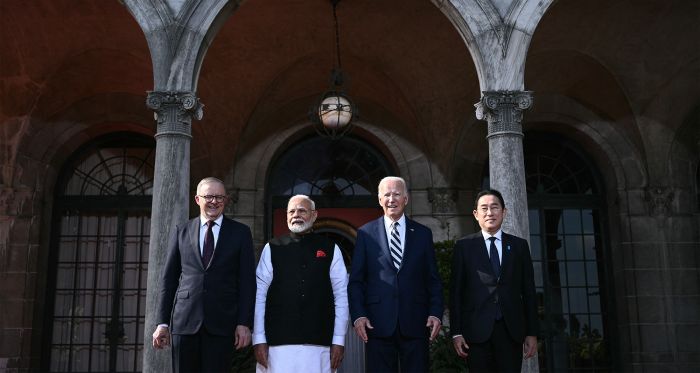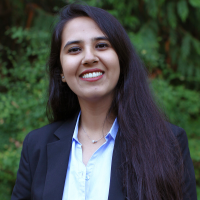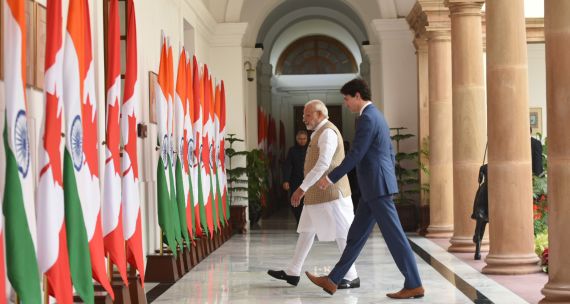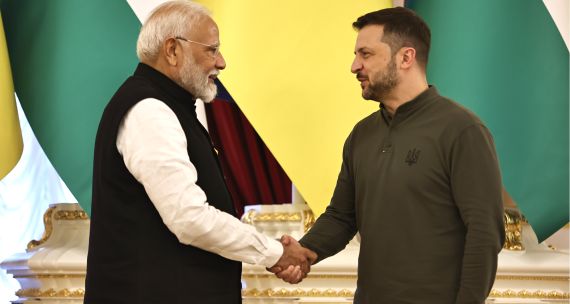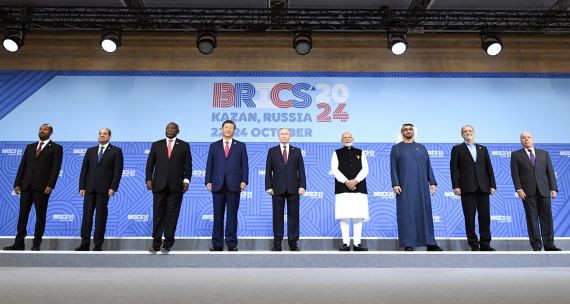The Takeaway
Indian Prime Minister Narendra Modi’s three-day visit to the U.S. in late September to attend the Quad Leaders’ Summit — comprising Australia, India, Japan, and the U.S. — reaffirmed India’s commitment to joint security efforts in the Indo-Pacific and highlighted the growing importance of the Quadrilateral Security Dialogue (known as the ‘Quad’) amid rising geopolitical tensions in the region.
The visit also underscored that India-U.S. ties are deepening despite allegations by the U.S. Department of Justice in November 2023 of New Delhi’s involvement in a murder-for-hire plot targeting a Sikh activist in New York. While similar issues have derailed Canada-India relations, ties between New Delhi and Washington have advanced, with their strategic co-operation reaching new heights in technology, defence, and regional security matters.
In Brief
- At their meeting in Wilmington, Delaware, the four Quad leaders agreed to extend co-operation on issues ranging from public health to semiconductor supply chains. The most notable efforts, however, focused on maritime security in the Indo-Pacific. Key initiatives that came out of the leaders’ summit include expanding joint training and naval operations to enhance interoperability, real-time monitoring of regional waters, and developing port infrastructure.
- Separately, Modi met with U.S. President Joe Biden for a bilateral discussion on strengthening India-U.S. ties. The two nations will jointly establish a new advanced semiconductor fabrication facility in the eastern Indian city of Kolkata.
- In advance of Modi’s arrival, White House officials met with Sikh activists in the U.S., assuring them of protection against “any transnational aggression on U.S. soil.” Despite these sensitivities in the relationship, Biden described U.S.-India relations during Modi’s visit as “stronger, closer, and more dynamic than ever.”
- Modi also met with top executives from major U.S. tech companies such as Nvidia, Alphabet, and IBM. He encouraged greater collaboration in artificial intelligence, biotechnology, and semiconductors to enhance India’s position as a hub for manufacturing and innovation.
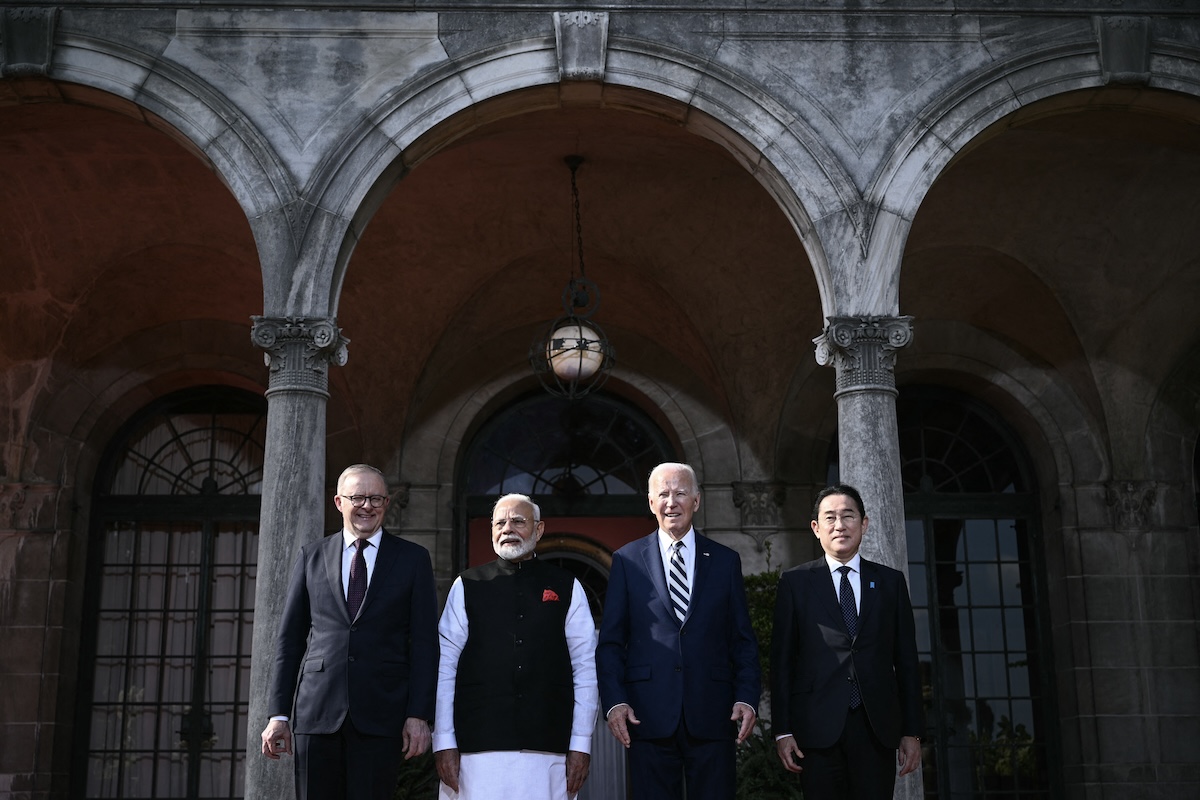
Implications
China remains an unnamed focus of Quad co-operation. While the minilateral grouping seeks to counterbalance China’s rising assertiveness in the Indo-Pacific region, it has thus far avoided directly naming Beijing as an adversary. Although the recent Quad leaders’ joint statement also refrained from explicitly mentioning China, Biden’s concerns about China were inadvertently captured on a ‘hot mic.’ The summit’s joint declaration featured stronger language regarding the South China Sea than in previous years, “express[ing] serious concern about the militarization of disputed features, and coercive and intimidating maneuvers in the South China Sea.”
The statement also underscored maritime security in the Indo-Pacific as a critical area of co-operation. This includes expansion of the Indo-Pacific Partnership for Maritime Domain Awareness, an existing agreement on real-time monitoring and tracking of regional waters, new initiatives on joint coast guard operations, increased military logistics co-operation, and port development.
Despite challenges, the India-U.S. strategic partnership has deepened. Shared security concerns in the Indo-Pacific and the need to build resilient supply chains amid growing economic and security competition with Beijing have helped to cement India-U.S. ties. So, too, has closer collaboration in critical technologies, artificial intelligence, and semiconductors, which has been bolstered by the Initiative on Critical and Emerging Technology, launched in January 2023.
These shared concerns and incentives have helped to foster resilience in the bilateral relationship, allowing it to withstand tensions over New Delhi’s enduring friendship with Moscow and the Indian government’s alleged involvement in a ‘murder-for-hire’ plot targeting a Sikh activist on U.S. soil.
What’s Next
1. Teaming up on ‘cancer moonshot,’ pandemic preparedness, and more
The Quad Cancer Moonshot announced at the summit will combat cervical cancer in the Indo-Pacific region. This initiative includes a pledge of US$7.5 million from New Delhi for vaccines that guard against cervical cancer and the provision of detection kits to other Indo-Pacific countries. Additionally, the Quad has launched an initiative for pandemic preparedness, under which India will host a workshop and release a white paper on emergency public health responses. Other areas of emerging collaboration include critical and security technologies, such as a new open radio access network for a secure and resilient telecommunications ecosystem to be provided to Pacific Island nations and Southeast Asia.
At the summit, Quad leaders also finalized a memorandum to collectively address semiconductor supply chain risks. India and the U.S. announced that they will establish an advanced semiconductor plant in Kolkata, which will focus on powering electronics for national security, next-generation telecommunications, and green energy applications.
2. Canada remains an outlier
While Ottawa’s 2022 Indo-Pacific Strategy identified New Delhi as a “critical partner,” Canada-India relations spiralled after Canadian Prime Minister Justin Trudeau’s statement in September 2023 on the alleged involvement of agents of the Indian state in the murder of a Canadian Sikh activist in Surrey, B.C. In contrast to deepening India-U.S. ties, Canada-India official diplomatic relations remain frozen. Canada remains an outlier as India’s relations with other Western nations continue to strengthen.
• Edited by: Erin Williams, Senior Program Manager, Vina Nadjibulla, Vice-President Research & Strategy, Ted Fraser, Senior Editor, APF Canada
